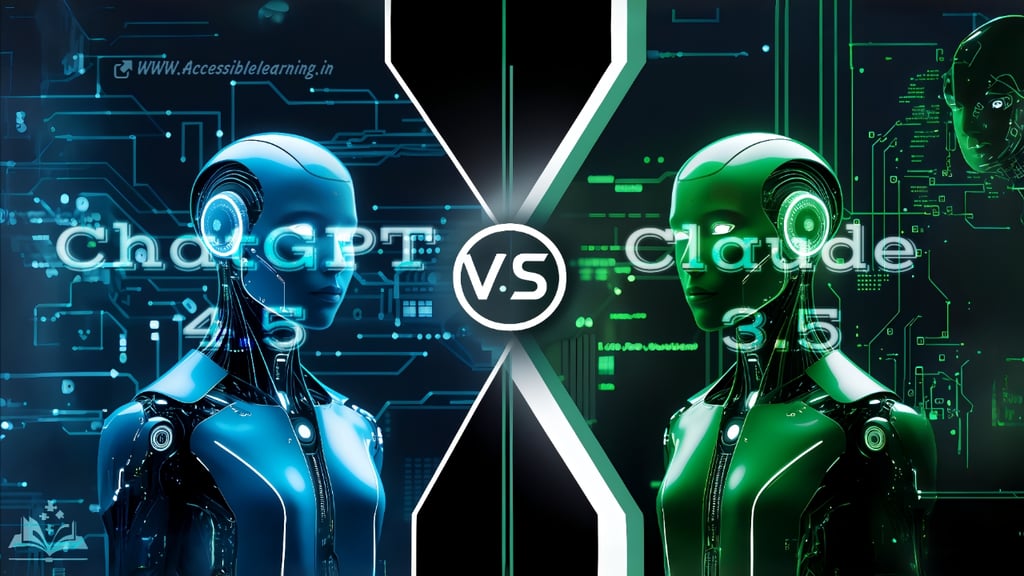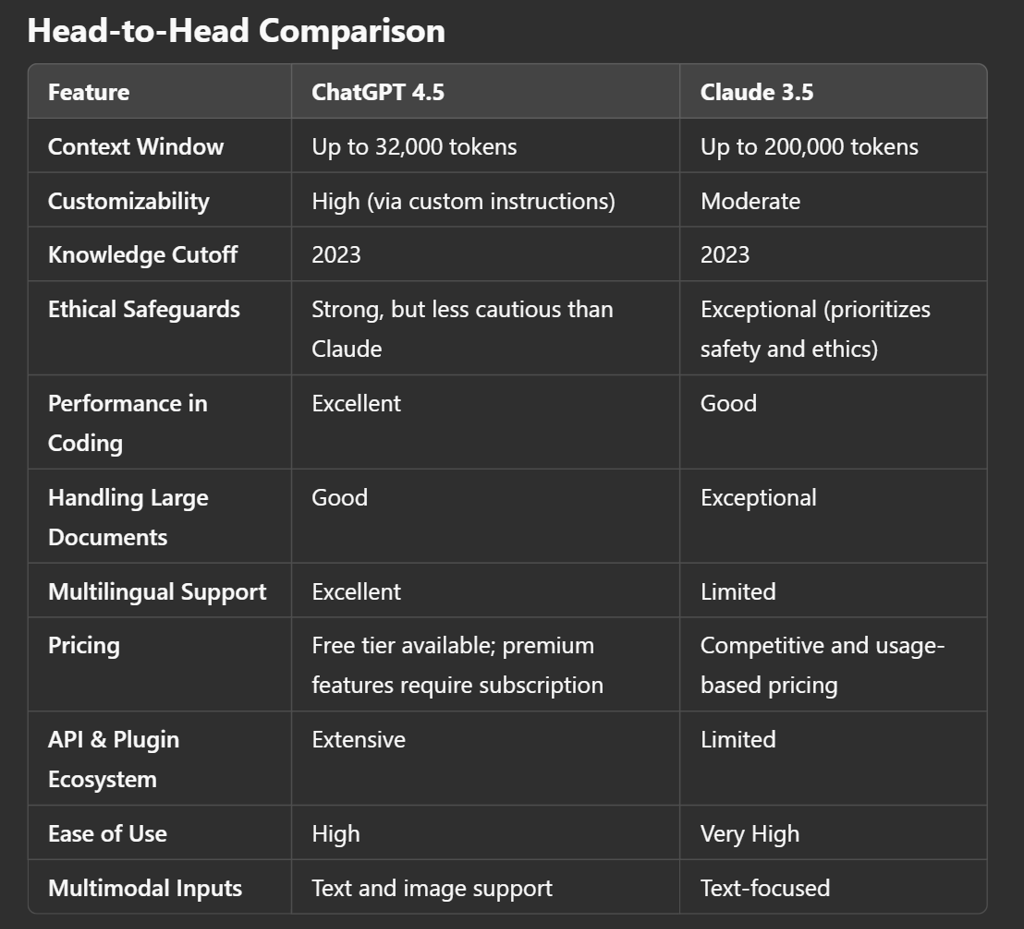
ChatGPT 4.5 or Claude 3.5: Which AI Assistant is Right for You?
Compare OpenAI's ChatGPT 4.5 and Anthropic's Claude 3.5 in this in-depth analysis of their features, strengths, weaknesses, and ideal use cases. Discover which AI Assistant suits your specific needs for creativity, document analysis, coding, and more
AI ASSISTANTAI/FUTUREEDITOR/TOOLSEDUCATION/KNOWLEDGE
Sachin K Chaurasiya
1/19/20254 min read


In the ever-evolving world of artificial intelligence, generative AI chatbots have become integral to businesses, educators, and individuals seeking efficient, intelligent, and human-like digital assistants. Two prominent contenders in this arena are OpenAI’s ChatGPT 4.5 and Anthropic’s Claude 3.5. Both models represent significant advancements in their respective lineages, offering unique features and capabilities. However, they cater to slightly different user needs and priorities. This article delves into the detailed comparison between ChatGPT 4.5 and Claude 3.5, highlighting their strengths, weaknesses, and ideal use cases.
OpenAI ChatGPT 4.5
OpenAI’s ChatGPT 4.5 builds upon the success of its predecessors, boasting enhanced conversational abilities, greater context retention, and improved performance across various domains. Known for its versatility and deep learning capabilities, ChatGPT 4.5 shines in:
Contextual Understanding: It can process and generate highly nuanced and complex responses, making it a reliable choice for professional use cases, such as content creation, coding, and problem-solving.
Custom Instructions: ChatGPT 4.5 allows users to fine-tune the assistant by setting specific behavioral guidelines, enabling more tailored interactions.
Expanded Knowledge Base: With its training data extending until 2023, ChatGPT 4.5 offers up-to-date and broad-spectrum insights across various industries.
Multimodal Features: ChatGPT 4.5 supports text and image inputs (depending on the plan), enhancing its ability to analyze visual data.
Integration Ecosystem: OpenAI’s focus on API integrations and plugins enables ChatGPT 4.5 to interact seamlessly with external tools, such as code interpreters and document processors.
Speed and Accuracy: Enhanced processing algorithms ensure quicker response times and higher accuracy for complex queries.
Community and Developer Support: OpenAI’s active community and documentation make it easier for developers to create custom applications and workflows using the model.
Multilingual Proficiency: ChatGPT 4.5 can generate responses in multiple languages, catering to a global user base.
Despite its impressive capabilities, ChatGPT 4.5 has limitations, including a subscription-based pricing model for premium features and occasional challenges with hallucination—where the AI confidently provides incorrect information.
Strengths
Exceptional versatility across diverse tasks.
Advanced API integrations and plugin support.
Highly customizable and responsive to user preferences.
Enhanced multimodal capabilities for text and image processing.
Active support community for developers and users.
Proficient in multilingual interactions, expanding global reach.
Weaknesses
Higher likelihood of hallucination compared to Claude 3.5.
Pricing structure may deter budget-conscious users.
Limited to a smaller context window for processing massive datasets.
Ideal Use Cases
Content Creation: Writing blogs, creating scripts, and drafting emails.
Coding and Development: Debugging, generating code, and providing explanations for technical concepts.
Customer Support: Responding to queries with a conversational and professional tone.
Creative Applications: Generating stories, brainstorming ideas, and creating visuals (with image input support).
Small to Medium Data Analysis: Summarizing and extracting insights from compact datasets.
Global Communication: Supporting multilingual projects and conversations.


Anthropic Claude 3.5
Anthropic’s Claude 3.5 is the latest iteration of their AI chatbot series, emphasizing safety, ethical considerations, and robust handling of large-scale queries. Named after Claude Shannon, the father of information theory, this model is designed to address challenges in AI alignment and user trust. Key highlights include:
Larger Context Window: Claude 3.5 boasts an extended context window, capable of processing up to 200,000 tokens, making it ideal for tasks like analyzing lengthy documents, legal texts, or large datasets.
Ethical and Safe Responses: Anthropic’s AI prioritizes generating responses that minimize harmful or biased outputs, making it a trusted choice for sensitive applications.
Efficiency in Multi-Turn Conversations: Claude 3.5 excels in retaining context over extended interactions, ensuring coherent and relevant responses even in lengthy discussions.
Ease of Use: The AI is designed to be intuitive, accessible, and user-friendly, catering to both casual users and professionals.
Focus on Privacy: Anthropic’s commitment to privacy and security is a standout feature, with measures to limit data retention and ensure user confidentiality.
Alignment with Ethical Principles: Claude 3.5 is particularly strong in adhering to user-provided guidelines while avoiding controversial or potentially harmful topics.
Handling Complex Data: It’s capable of parsing and summarizing intricate datasets, which is invaluable for data analysts and researchers.
Natural Conversational Style: Claude 3.5 is highly conversational and mirrors human-like interaction patterns effectively.
However, Claude 3.5’s cautious approach to generating outputs can sometimes result in overly conservative responses, limiting its versatility compared to ChatGPT 4.5.
Strengths
Outstanding performance with large context tasks.
Prioritizes ethical and safe interactions.
User-friendly with a focus on privacy.
Exceptional for analyzing lengthy or complex documents.
Highly reliable for sensitive applications requiring caution and alignment.
Natural and conversational in tone, enhancing user engagement.
Weaknesses
Conservative responses can limit its adaptability.
Less robust ecosystem for third-party integrations and tools.
Lacks multimodal input capabilities, restricting its application scope.
Ideal Use Cases
Document Analysis: Summarizing, reviewing, or querying large-scale documents.
Ethically Sensitive Tasks: Use cases requiring high safety and bias mitigation.
Legal and Financial Services: Processing lengthy legal texts or financial reports.
Extended Conversations: Maintaining coherence over long discussions.
Large Data Parsing: Ideal for handling and processing massive datasets with extended context.
Privacy-Centric Applications: Scenarios requiring strict data confidentiality.


Which One Should You Choose?
Choose ChatGPT 4.5 if you value versatility, customization, and integration capabilities. It’s ideal for creative, professional and technical applications.
Choose Claude 3.5 if your priorities include ethical safeguards, handling large documents, and maintaining privacy. It’s particularly suited for legal, financial, or research-focused tasks.
Future Directions
Both OpenAI and Anthropic are continuously innovating to refine their models. In the future, we can expect:
ChatGPT to further enhance its multimodal abilities, expand its context window, and reduce instances of hallucination.
Claude to strengthen its integration ecosystem and balance cautiousness with versatility.
Both ChatGPT 4.5 and Claude 3.5 represent the cutting edge of AI conversational models, excelling in their own domains. ChatGPT 4.5 is a powerhouse of versatility and creativity, while Claude 3.5’s strength lies in its ethical rigor and ability to handle large-scale queries. Understanding your unique requirements and use cases is key to leveraging these models effectively. Whichever you choose, both are robust tools that showcase the remarkable progress in generative AI technology.
Subscribe To Our Newsletter
All © Copyright reserved by Accessible-Learning Hub
| Terms & Conditions
Knowledge is power. Learn with Us. 📚


